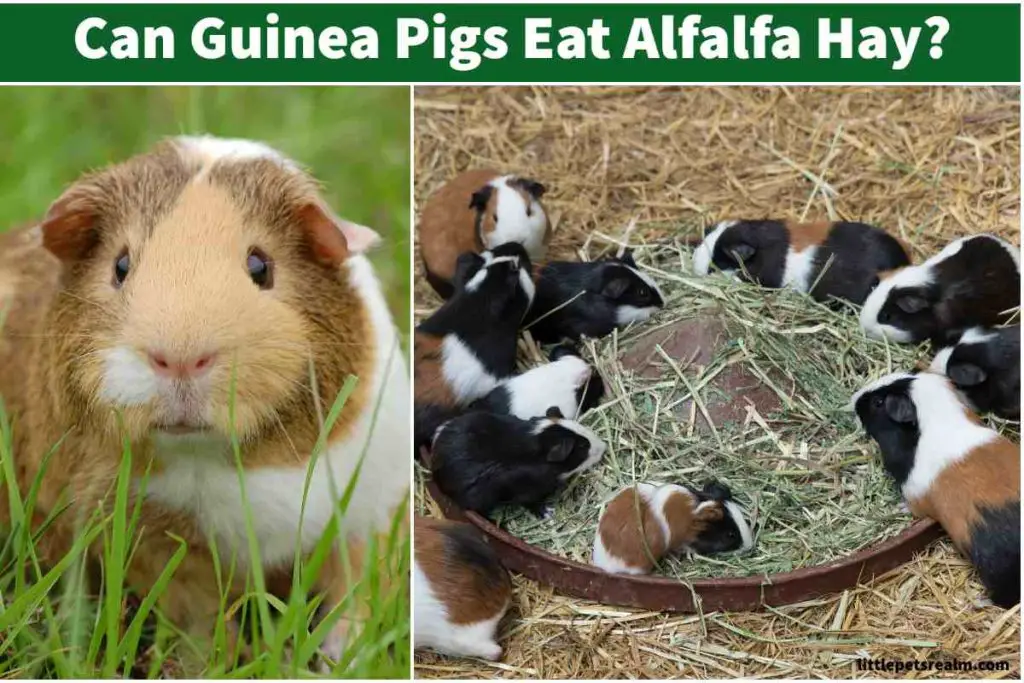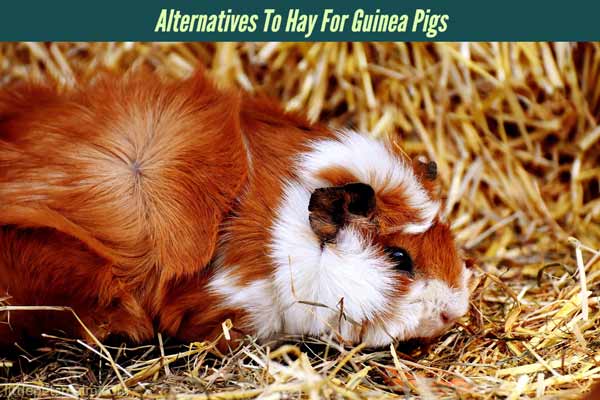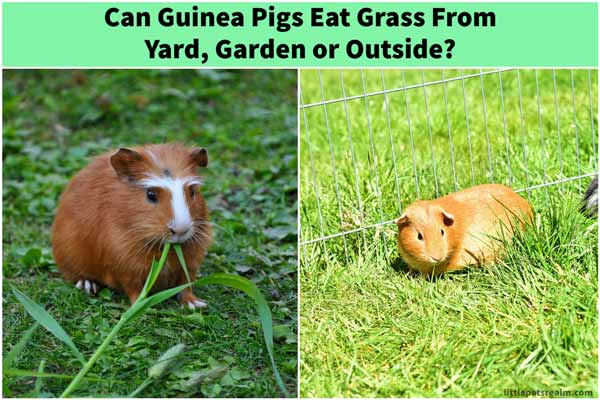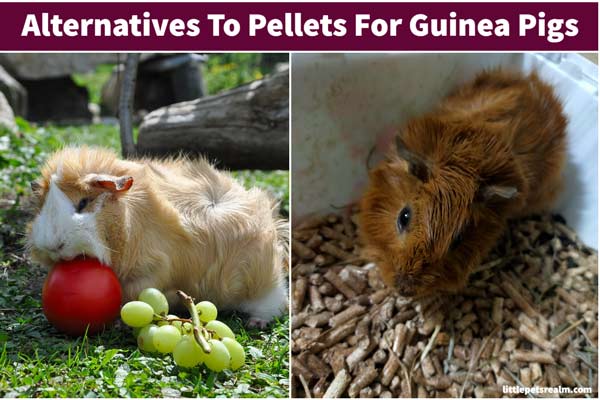You may hear that alfalfa hay is a great food for small pets. But, it has some restrictions to feed them. So you might wonder, Can guinea pigs eat alfalfa hay?
Not all guinea pigs can be fed alfalfa hay equally because of the high calcium level in it. Usually, alfalfa hay is recommended for pregnant, nursing, and baby guinea pigs to fulfill the requirement of additional calcium. Adult guinea pigs can eat it only as an occasional treat.
But, you may also need to know how much alfalfa hay you can feed your guinea pigs, when they can eat it and which is the best product to buy.
Let’s find it out.
Table of Contents
Is alfalfa hay good for guinea pigs?
Alfalfa hay can provide a lot of nutrition including calcium and protein to your guinea pigs. This hay is good for young, pregnant, and nursing guinea pigs as they need the additional calcium and protein from it. However, feeding a lot of alfalfa hay is bad for adult guinea pigs, because this high amount of calcium can lead to bladder stones and digestive issues. It should not be fed along with pellets for the same reason.

What Is alfalfa hay for guinea pigs?
Alfalfa Hay, also known as legume hay is a special type of grass used to feed predominantly breeding and growing animals including guinea pigs. This hay is also called lucerne in the United Kingdom and Australia. This hay is a great source of nutrients and provides a lot of energy.
When can you feed your guinea pigs alfalfa hay?
In the following situations, guinea pigs can eat alfalfa hay.
Having a growing guinea pig
Calcium and protein presented within alfalfa hay are required for growing guinea pigs under the age of 6 months. So, you have to feed it to the baby or newborn guinea pigs.
Having a breeding or lactating guinea pig
Alfalfa is also essential for pregnant or lactating guinea pigs to offer them extra calcium and proteins.
Gaining weight
When your guinea pigs get sick and lose some weight or they are underweight for some reason, your vet may recommend you feed them alfalfa hay to help them increase their weight.
Occasional treat
You can offer alfalfa hay as an occasional treat to your guinea pigs to change their taste and provide additional nutrition. But, offer it in a limited quantity to prevent health issues.
What are the benefits of alfalfa hay for guinea pigs?
Here are the advantages of alfalfa hay for guinea pigs.
Great for pregnant and nursing guinea pigs
Pregnancy and lactating female guinea pigs need more energy and important nutrients such as calcium. Alfalfa hay can provide that and help them during this time.
Helps newborn and young guinea pigs to grow
Baby guinea pigs under the age of 6 months require additional protein and calcium to grow up properly. This hay is appropriate for them to fulfill this criterion.
Rich in fiber
Just like other hay, alfalfa hay also contains plenty of fibers. Fiber is the essential nutrient for your little piggies. It improves the digestive system and helps the body use other nutrients in the body properly.
Provides additional calcium if needed
Though excess calcium is bad for guinea pigs, it is also required for their health if they get in adequate amounts. As alfalfa hay contains a lot of calcium, it can help your piggies when they need extra calcium in their diet.
Packed with various important nutrients
Alfalfa hay is very nutritional for your guinea pigs if you feed them in the required quantity. This hay is rich in fibers, calcium, vitamin, minerals, and proteins.
So, it can be a good option to support their nutrition.
This can boost their energy and support their health.
Nutritional value of Alfalfa hay
38% Crude fiber
13% Crude protein
1.2% Calcium
1.3% Crude fat
Aids in gaining weight
Since alfalfa hay offers high calories, it can be beneficial for those guinea pigs who need to gain weight.
Improves digestive system
The high fiber of the alfalfa hay boosts the digestive system of the little piggies, helps digest food properly, and supplies all the nutrients in the body.
Supports dental health
Alfalfa hay helps support dental health similar to other hay. This type of food is necessary for them to prevent overgrowth of their teeth because their teeth grow continuously throughout their life.
What are the drawbacks of alfalfa hay for guinea pigs?
Following are the disadvantages of using alfalfa hay for guinea pigs.
A high amount of calcium
The main drawback of alfalfa hay is the high amount of calcium within it. This excess calcium increases the normal calcium level in your guinea pig’s body. This leads to bladder stone formation, diarrhea, and other health issues.
Develops urinary stones
Too much calcium in guinea pig’s diet results in urinary stones formation because of the rapid absorption of calcium in their body. Since this hay possesses a high level of calcium, feeding them too much of it or feeding regularly will increase the calcium in the urine and cause urinary stones.
High calorie and protein
This hay is rich in protein and calorie-dense. You shouldn’t feed them more calories than recommended. So, if your guinea pig eats it daily, it will cause various health issues. Try to provide them with a balanced diet.
Causes diarrhea due to too much eating
Excessive or regular eating of this hay can lead to diarrhea due to greater amounts of calcium and protein in it. This can cause more gastrointestinal problems if you offer your piggies pellet and alfalfa hay at the same time.
May lead to obesity
You shouldn’t let your guinea pigs be overweight. This can lead to various health problems. Since alfalfa hay contains too many calories, this can cause unexpected weight gain and obesity.
More palatable
Being more palatable, they can overeat this hay so easily. So, it can cause various health-related complications.
How much alfalfa hay should you feed your guinea pigs?
Pregnant and baby guinea pigs can eat very small amounts of alfalfa hay every day. You can also feed your adult guinea pigs alfalfa hay once a while in small amounts, but it’s not mandatory for them. Add the hay to the diet with very small amounts initially and see how they respond to it. Don’t offer adult guinea pigs alfalfa hay on a daily basis or too frequently to prevent any health issues.
However, if your guinea pigs eat pellets, don’t offer them this type of hay. Besides, remember all the drawbacks of feeding this hay to adult guinea pigs.
Alfalfa Hay vs Timothy hay: Which is better?
Now you know the pros and cons of alfalfa hay, you might also want to know the difference between alfalfa hay and timothy hay and which one is better?
Timothy hay is the best for feeding your guinea pig regularly in a large quantity while alfalfa hay is great to provide additional nutrition to pregnant, nursing, and newborn guinea pigs.
Alfalfa hay is useful to fulfill certain needs and can be used as an occasional treat for adult guinea pigs whereas timothy hay is the primary food for every guinea pig.
The basic difference between alfalfa hay and timothy hay is that alfalfa hay is legume hay whereas Timothy hay is grass hay.
So, alfalfa hay contains higher protein, calcium, and calories than timothy hay. On the other hand, timothy hay provides more balanced nutrition.
However, both hay is good forage sources for guinea pigs and contains plenty of fibers.
Since alfalfa hay has much higher calcium than timothy hay, it can cause bladder stones, digestive issues, and other health problems when the little piggies eat it regularly or in a large amount.
On the other hand, you can feed them unlimited timothy hay. In fact, it’s mandatory for their dental health, digestive system, and overall health. Timothy hay is also readily available.
Alfalfa hay is also higher in protein and calories, therefore can cause obesity. On the other hand, timothy hay doesn’t have this problem.
Timothy hay may cause allergy to some guinea pigs, but alfalfa hay usually doesn’t lead to this type of problem.
Alfalfa hay is also better for the growth of baby guinea pigs.
Can guinea pigs eat alfalfa hay instead of timothy hay?
Alfalfa hay can’t replace timothy hay due to higher calcium levels and adverse effects on health from regular or overfeeding to guinea pigs. Moreover, timothy hay has more nutritional value, necessary for guinea pig’s health, and acts as the main diet as well. However, alfalfa hay can be a great choice for pregnant, nursing, and baby guinea pigs to offer extra nutrition.
Best alfalfa hay for guinea pigs – Oxbow Alfalfa Hay
Oxbow offers the best alfalfa hay for guinea pigs. It provides high fibers and other essential nutrients. Oxbow Alfalfa Hay can help pregnant or newborn guinea pigs to get extra calcium and protein for their body. You can also use it to help your guinea pig gain weight if your vet suggests.
Is alfalfa hay safe for guinea pigs?
Generally, alfalfa hay is safe for guinea pigs if you feed them an adequate amount. Eating too much alfalfa hay or eating regularly is bad for adult guinea pigs, as it contains a lot of calcium and protein. This results in urinary stones and digestive upsets.
Takeaways
Guinea pigs can eat alfalfa hay without having any health issues if you follow the proper guideline for them. This hay is the best for baby and pregnant guinea pigs to fulfill the requirement of additional calcium and other nutrients. But, adult guinea pigs can eat it as a treat occasionally or get extra nutrition when required.
If you feed too much of this hay, it can lead to urinary stones and other health complications due to the high calcium present within it.

I am Pallab Kishore, owner of Little Pets Realm. I share important tips, advice and answer all the queries to solve various problems about small pets such as guinea pigs and hamsters on this website.



